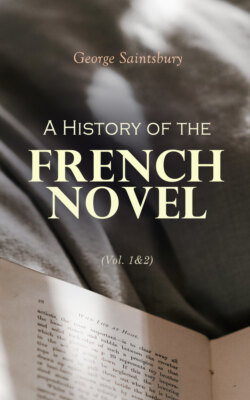Читать книгу A History of the French Novel (Vol. 1&2) - Saintsbury George - Страница 13
На сайте Литреса книга снята с продажи.
FOOTNOTES:
Оглавление[58] That is, of nothing like the length of the latest forms of the Chansons de Geste or the Arthurian Romances proper. Some of the late fourteenth- and fifteenth-century Adventure stories, before they dropped into prose, are indeed long enough, and a great deal too long; but they show degeneracy.
[59] The h (Parth-) does occur in both forms, and there are other variation, as "Partonopeus," etc. But these are trifles.
[60] Taking honour to the mother as separate from that to the father.
[61] The Spanish-English form is perhaps the prettier. I am sorry to say that the poet, to get a rhyme, sometimes spells it "Urracle," which is not pretty. Southey's "Queen Orraca" seems to me to have changed her vowel to disadvantage.
[62] The original author of the Court of Love, whether Chaucer or another, pretty certainly knew it; and Spenser spiritualised the doctrine itself in the Four Hymns.
[63] I think the medical people (borrowing, as Science so often does, the language which she would fain banish from human knowledge) call this sort of thing a syndrome.
[64] See below on Urraca's plain speaking.
[65] Not too commentatorially identified with Constantinople.
[66] It may be worth noting that in this context appears the original form of an English word quite common recently, but almost unknown a very short time ago—"grouse" in the sense of "complain," "grumble": "Ce dist Corsols et nul n'en grouce."
[67] No one will be rude enough to disbelieve her, and, as will be seen, her supernatural powers had limits; but it was odd, though fortunate, that they should have broken down exactly at this important juncture. Who made those rebellious candles take him to that chamber and couch, unknown to her?
[68] For Melior, though of invisible beauty, is represented as delightful in every other way, as wise and witty and gracious in speech as becomes a white witch. And when her lover on one occasion thanks her for her sermon, there is no satire; he only means sermo.
[69] Like Guy of Warwick; still more like Mr. Jaggers's clerk, though the circumstances are reversed. He almost says in so many words, "Hullo! here's an engagement ring on my finger. We can't have a marriage."
[70] The author, more suo, intimates that the Court ladies by no means shared these hostile feelings, and would have willingly been in Melior's place.
[71] He induces him to turn Christian on the supposition of being his companion; and then gives him the slip. The neophyte's expressions on the occasion are not wholly edifying.
[72] The good palfrey is found and in a state to carry his master, who is quite unable to walk. One hopes they did not leave the beast to the lions, tigers, wyverns, etc., for he could hardly hope for such a literal "stroke of luck" again.
[73] The name will suggest, to those who have some wine-lore, no less a vintage than Château Yquem. Nothing could be better for a person in the Count's condition as a restorative.
[74] These two directions obviously refer to the common mediaeval "wimple" arrangement.
